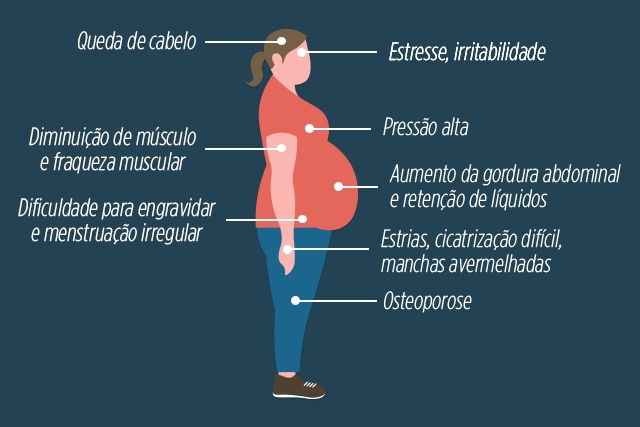High cortisol levels mainly occur due to prolonged corticosteroid use, which can happen when treating health conditions like lupus or organ transplants. Increased production of this hormone may also be the result of chronic stress or tumors in the adrenal glands or pituitary gland.
Cortisol is a hormone that is produced by the adrenal glands. Its functions include regulating metabolism, reducing inflammation and contributing to immune system function. High levels, however, can lead to symptoms like weight gain, high blood pressure. diabetes or osteoporosis.
To determine whether your cortisol levels are high, a family doctor or endocrinologist may order a cortisol blood test, urine test or saliva test. If high, the doctor may recommend regular exercise, decreased sugar intake and a diet that promotes stress relief, Severely high cortisol levels may require medication or even surgical interventions.

Common symptoms
The main symptoms of high cortisol levels are:
- Increase in weight. abdominal circumference and swelling, due to fluid retention and redistribution of body fat.
- Diabetes and increased sugar levels, due to the liver producing more glucose.
- Osteoporosis, due to decreased calcium absorption and collagen reduction.
- Increased stress, irritability and depression, due to the release of adrenaline and its direct action on the brain.
- High cholesterol, due to the increase in fat production in the liver and fat release into the bloodstream.
- Muscle loss and weakness, from decreased protein production and protein breakdown in the tissues.
- High blood pressure, because of sodium and fluid retention, and due to increased adrenaline levels in the blood.
- Decreased defense mechanisms in the body, due to a reduced inflammatory response and reduced overall immunity.
- Increased male hormones, which in women, can cause more body hair growth, a thicker voice, or hair loss.
- Changes to menstrual cycle and infertility, due to an imbalance of female hormones.
- Fragile skin, leading to more wounds, rashes and stretch marks, due to reduced collagen and healing abilities.
These changes are caused mainly due to persistently high cortisol level, which can lead to Cushing’s syndrome.
Confirming a diagnosis
If high cortisol levels are suspected, the doctor may order bloodwork, urine tests or a saliva tests to evaluate the level of this hormone in the body.
If confirmed, the doctor may then investigate the underlying cause, which can be done through clinical assessment, a CT or MRI of abdomen and head, a PET scan or scintigraphy.
Possible causes
Increased cortisol levels may be related to some factors, such as:
- Use of corticosteroid medications, like prednisone or dexamethasone, for more than 15 days and/or at high doses
- Adrenal gland dysfunction, caused by a tumor or dysregulation at a cellular level, leading to increased cortisol production
- A pituitary gland tumor, which can stimulate the production of cortisol in the suprarenal glands.
- Adrenal gland tumor, as this gland also produces cortisol.
- Excess stress and irregular sleep, which can dysregulate cortisol production and lead to higher levels in the blood.
Stress seems to be a factor in mild changes to cortisol levels, which significantly elevated levels are usually a sign of a gland issue.
How to lower cortisol levels
Because cortisol is closely linked to emotions, a great way to regulate cortisol levels is by reducing stress and anxiety with psychotherapy and pleasurable activities. You should also exercise and eat foods that are rich in protein and potassium, like milk, dairy products, fish, oats, almonds, chestnuts, chia seeds and flaxseeds.
High cortisol levels caused by corticosteroids can be treated by gradually weaning the patient off the medication over a course of several days. This should be done under the direction of a family doctor or neurologist.
Elevated cortisol due to a serious health condition, like a tumor, should be treated with medication to lower levels. Medications include metyrapone and aminoglutethimide. The doctor may advise surgical removal of the tumor, which will be coordinated by the surgeon and endocrinologist.
Why pregnancy increases cortisol levels
High cortisol levels in pregnancy are common, especially in the last weeks of gestation. The placenta produces a hormone called CRH, which stimulate cortisol synthesis and leads to increased levels.
However, a high cortisol level does not appear to affect the mother or baby‘s health as it would in a non-pregnant patient. This increase is necessary to maintain a healthy pregnancy and it appears to even help with fetal brain and pulmonary development. This is why babies who are born prematurely are at a higher risk for respiratory problems. Women who are at a high risk for premature labor are usually given synthetic corticosteroids to stimulate organ development in the baby.
Complications of high cortisol, like Cushing’s snydrome, are very rare during pregnancy and even in the post-partum period, as high levels tends to lower following the baby’s birth.
